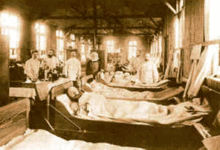1881–1896 cholera pandemic



The fifth cholera pandemic (1881–1896) was the fifth major international outbreak of cholera in the 19th century. It spread throughout Asia and Africa, and reached parts of France, Germany, Russia, and South America. It claimed 200,000 lives in Russia between 1893 and 1894; and 90,000 in Japan between 1887 and 1889.[1][2] The 1892 outbreak in Hamburg, Germany was the biggest European outbreak; about 8,600 people died in that city. Although many residents held the city government responsible for the virulence of the epidemic (leading to cholera riots in 1893[3]), it continued with practices largely unchanged. This was the last serious European cholera outbreak of the century.
Pope Leo XIII authorized the construction of a hospice inside the Vatican for afflicted residents of nearby Roman neighbourhoods. That building was torn down in 1996 to make way for construction of the Domus Sanctae Marthae.[4]
The events surrounding the cholera pandemic in Bologna in 1855 were described by the city's Sanitation Department or Delegation, published in 1857. The treatise also describes prior plagues afflicting the city.[5]
Scientific debate[]
During the pandemic, Robert Koch isolated Vibrio cholerae and proposed postulates to explain how bacteria caused disease. His work helped to establish the germ theory of disease.[citation needed]
Prior to this time, many physicians believed the disease was caused by direct exposure to the products of filth and decay. Koch helped establish that the disease was more specifically contagious and was transmitted by exposure to the feces of an infected person, including through contaminated water supply.[citation needed]
Mark Twain[]
American author Mark Twain, an avid traveler, visited Hamburg during the cholera outbreak, and he described his experience in a short, uncollected piece dated "1891–1892". Therein, he notes alarmingly the lack of information in Hamburg newspapers about the cholera event, particularly death totals. He also criticizes the treatment of the poor, as many, Twain says, were getting "snatched from their homes to the pest houses", where "a good many of them ... die unknown and are buried so". Twain concludes by lamenting the lack of awareness worldwide, especially in America.[6]
See also[]
References[]
- ^ "Cholera's seven pandemics". Canadian Broadcasting Corporation. May 9, 2008. Retrieved 14 May 2020.
The fifth pandemic swept through Asia, Africa, South America and parts of France and Germany. Cholera claimed 200,000 lives in Russia between 1893 and 1894; and 90,000 in Japan between 1887 and 1889. Quarantine measures for ships and immigrants based on the findings of the British physician, John Snow, prevented cholera outbreaks in Great Britain and the United States.
- ^ J. N. Hays (2005). Epidemics and pandemics: their impact on human history. ABC-CLIO. ISBN 1851096582.
- ^ "CHOLERA RIOT IN HAMBURG; SANITARY OFFICERS AGAIN ATTACKED BY A MOB. One of Them Knocked Down and Kicked and Trampled to Death – A Policeman Also Killed by the Infuriated Crowd – Troops Charged the Mob with Fixed Bayonets and Dispersed It, but Not Until It Had Injured Several Persons by Its Violence" (PDF). Retrieved 25 June 2017.
- ^ "Domus Sanctae Marthae & The New Urns Used in the Election of the Pope", ewtn.com, Retrieved February 10, 2009
- ^ cholera morbus nella città di Bologna l'anno 1855. Relazione della deputazione comunale di sanità preceduta da notizie storiche intorno le pestilenze nel Bolognese, published by della Volpe and dei Sassi, Bologna 1857.
- ^ Blount, Roy K. (2010). A tramp abroad. Following the equator: other travels. New York: Library of America. p. 1145.
Further reading[]
- Howard Markel (17 May 1999). Quarantine!: East European Jewish Immigrants and the New York City Epidemics of 1892. Johns Hopkins University Press, 1999. ISBN 978-0-80186180-2.
- Richard J. Evans. Death in Hamburg: Society and Politics in the Cholera Years 1830–1910. Penguin Books, 2005. ISBN 978-0143036364
- Cholera pandemics
- 19th-century health disasters
- 19th-century epidemics
- 1880s health disasters
- 1890s health disasters
